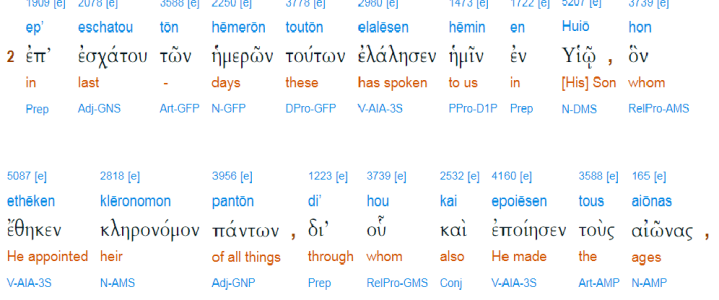It's a pleasure interacting with you in this Forum
The quote in Hebrews 1:1-2 refers to the revelation of Jesus as the most recent one: "but in these last days..."
It does not say that there would be no revelation after that.
Indeed, by the time the epistle of Hebrews was written, there had been other teachings given by the apostles that Jesus had not spoken, right?
In 1 Corinthians 13, Paul talks about a future, distant time in which prophecies would cease.
Likewise-
Analysis of Hebrews 1:1-2
Greek Structure and Syntax:
The Greek text of Hebrews 1:1-2 emphasizes a transition in the manner of God’s revelation. It begins,
"Πολυμερῶς καὶ πολυτρόπως πάλαι ὁ Θεὸς λαλήσας τοῖς πατράσιν ἐν τοῖς προφήταις" ("In many parts and in many ways, God spoke to the fathers by the prophets"). This phrase sets up a contrast between earlier, fragmentary revelations through the prophets and a completed revelation in Jesus.
The pivotal clause here is: “ἐπ’ ἐσχάτου τῶν ἡμερῶν τούτων ἐλάλησεν ἡμῖν ἐν Υἱῷ” (“in these last days, He has spoken to us
in [the] Son”). The aorist verb “ἐλάλησεν” (elalēsen, "has spoken") implies a definitive act in Greek, often emphasizing completeness or a past action with enduring significance.
Definite Article Use: “ἐν Υἱῷ” (“in [the] Son”) places emphasis on Jesus not as one among many revelators but as the unique and ultimate revelation.
Unlike the indefinite “prophets” mentioned earlier, the Son is presented as the culmination of God’s revelation.
Implications of “Last Days”: The phrase “ἐπ’ ἐσχάτου τῶν ἡμερῶν τούτων” (“in these last days”) conveys the sense of eschatological finality, a term often signaling the completion or climax of God’s plan (e.g., Acts 2:17).
This suggests that the revelation through the Son represents not just another message but the full, complete revelation from God.
Addressing your Claim About Continued Revelation
The structure of Hebrews 1:1-2 supports the view that Jesus is the culmination of divine revelation, rather than merely the latest in an ongoing series. Other New Testament texts support this interpretation:
John 14:26 - Jesus promises the Holy Spirit would “teach you all things and bring to your remembrance all that I have said to you.” This indicates that the Spirit’s role is not to introduce new, independent revelations but to illuminate and apply Jesus’ teaching, reinforcing its finality.
1 Corinthians 13:9-10 and the Cessation of Prophecies
Greek Context:
In 1 Corinthians 13:9-10, Paul writes, “For we know in part, and we prophesy in part; but when the perfect [τὸ τέλειον, to teleion] comes, the partial will pass away.” Here, the term “τὸ τέλειον” (to teleion, “the perfect” or “completion”) suggests a point when the need for partial revelations will cease.
Paul does not specify that this will introduce additional new revelations but implies that prophecies and knowledge will conclude when this “completion” is reached.
Thank you for the thought-provoking points.
@Pancho Frijoles - It’s true that the apostles expounded on Jesus’ teachings, and the Holy Spirit helped clarify His words.
However, Hebrews 1:1-2 uses a unique grammatical structure that suggests God’s ultimate revelation came through His Son.

The phrase ‘in these last days’ and the use of the aorist verb ‘has spoken’ imply a completed, climactic revelation. Additionally, in 1 Corinthians 13, Paul speaks of a time when prophecies will cease, but he links this to the coming of ‘the perfect,’
rather than to additional future revelations. This might imply that the fullness we need is already in Christ’s teachings.”
At the end of these days (ep' eschatou tōn hēmerōn toutōn). In contrast with palai above.
Hath spoken (elalēsen).
First aorist indicative of laleō, the same verb as above, “did speak”
in a final and full revelation.
In his Son (en huiōi). In sharp contrast to en tois prophētais.
“The Old Testament slopes upward to Christ” (J. R. Sampey).
No article or pronoun here with the preposition en, giving the absolute sense of “Son.”
Here the idea is not merely what Jesus said, but what he is (Dods), God’s Son who reveals the Father (Joh_1:18). “The revelation was a son-revelation” (Vincent).
Hath appointed (ethēken). First aorist (kappa aorist) active of tithēmi, a timeless aorist.
Heir of all things (klēronomon pantōn). See Mar_12:6 for ho klēronomos in Christ’s parable, perhaps an allusion here to this parable (Moffatt).
The idea of sonship easily passes into that of heirship (Gal_4:7; Rom_8:17). See the claim of Christ in Mat_11:27; Mat_28:18 even before the Ascension.
Through whom (di' hou). The Son as Heir is also the Intermediate Agent (dia) in the work of creation as we have it in Col_1:16.; Joh_1:3.
The worlds (tous aiōnas). “The ages” (secula, Vulgate). See Heb_11:3 also where tous aiōnas = ton kosmon (the world) or the universe like ta panta (the all things) in Heb_1:3; Rom_11:36; Col_1:16. The original sense of aiōn (from aei, always) occurs in Heb_6:20, but here “by metonomy of the container for the contained” (Thayer) for “the worlds” (the universe) as in lxx, Philo, Josephus.
Robertson.
Therefore I cannot accept your interpretation brother, or rather, re-interpretation, respectfully.
Johann.

